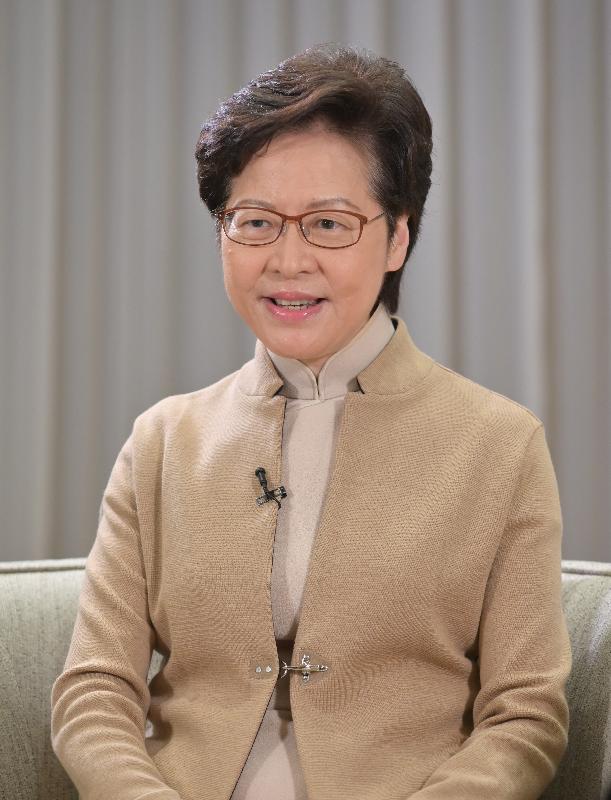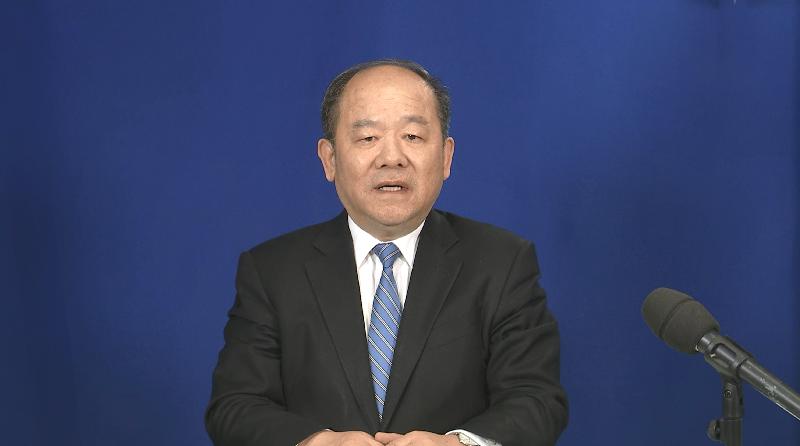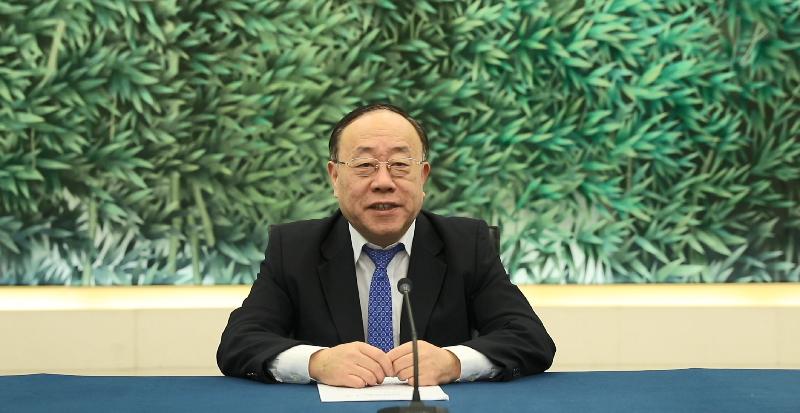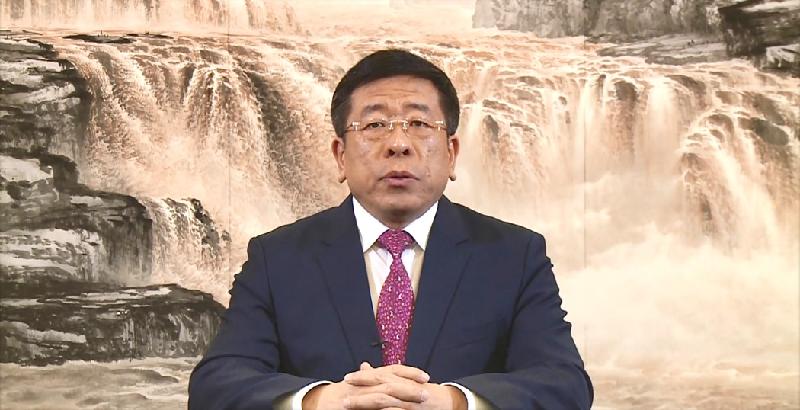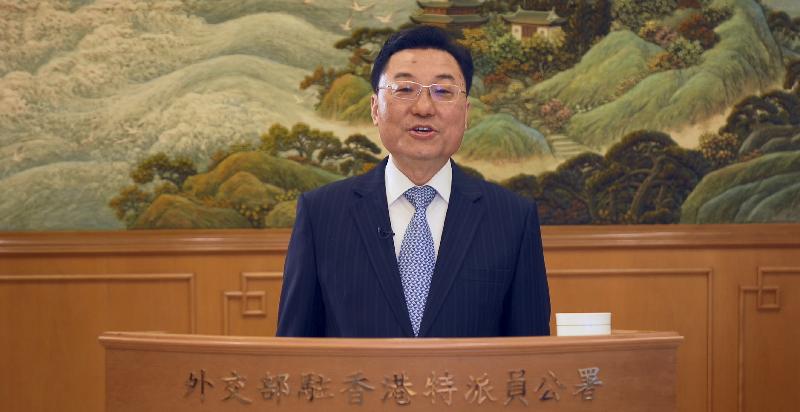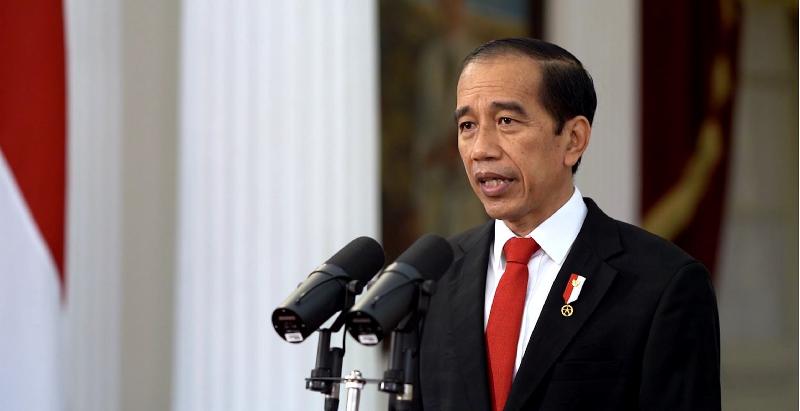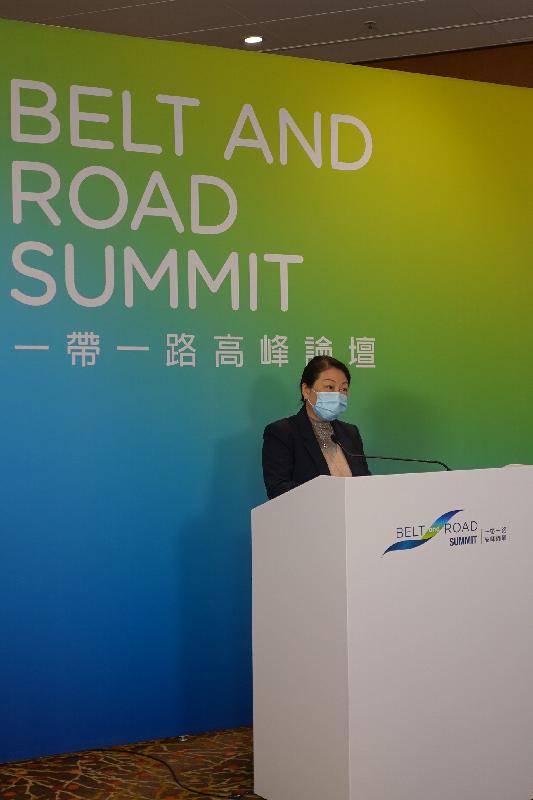Fifth Belt and Road Summit brings together government and business leaders to explore collaboration opportunities along Belt and Road (with photos)
The fifth Belt and Road Summit opened today (November 30) with over 6 000 government officials, entrepreneurs and professionals from about 80 countries and regions signed up to participate online to explore collaboration opportunities along the Belt and Road.
The Summit is themed "A Business Vision for Sustainable and Inclusive Future". The Chief Executive, Mrs Carrie Lam, delivered an opening address this morning, followed by special addresses from Vice Chairman of the National Development and Reform Commission Mr Ning Jizhe; Vice Minister of Commerce Mr Wang Bingnan; Vice Chairman of the State-owned Assets Supervision and Administration Commission of the State Council Mr Ren Hongbin; and the Commissioner of the Ministry of Foreign Affairs of the People's Republic of China in the Hong Kong Special Administrative Region (HKSAR), Mr Xie Feng. The President of the Republic of Indonesia, Mr Joko Widodo, graced the Summit and delivered the keynote speech.
Mrs Lam highlighted in her opening address the importance of global collaboration at this time of profound changes, which had the potential to unleash widespread innovation and create abounding opportunities, citing, as examples, the robust emergence of virtual banks and insurers in Hong Kong and the successful raising of venture funding by Hong Kong-based start-ups despite the COVID-19 epidemic.
She also took the opportunity to congratulate the 15 states on the signing of the Regional Comprehensive Economic Partnership (RCEP) earlier this month, stressing that the agreement was a strong testimony to free trade, multilateralism and regional co-operation, and would inject fresh impetus to the global economic recovery. Mrs Lam said that Hong Kong had received clear support from some of the Partnership's member states on joining the RCEP and looked forward to beginning discussions on Hong Kong's accession at the earliest opportunity.
Mrs Lam said that Hong Kong, as an active player in the Belt and Road Initiative, was keen to strengthen collaboration and partnership with other Belt and Road economies on various fronts, including the sharing of its home-grown, anti-epidemic technology to support the fight against the virus; the provision of professionals capable of meeting the wide-ranging service needs of Belt and Road projects; boosting green finance and sustainable investment along the Belt and Road; and promoting business partnerships with the Mainland's overseas Economic and Trade Co-operation Zones (ETCZs). The latter in particular would offer many opportunities to Hong Kong enterprises and their partners when the Mainland of China was pursuing the "dual circulation" development pattern, which emphasised the linking of its domestic and international markets.
The Financial Secretary, Mr Paul Chan, addressed the audience at the "Business Plenary: Powering the World's Recovery through Sustainable and Inclusive Development". He pointed out that Hong Kong was increasingly turning to green and sustainable finance to drive initiatives in public health, climate resilience, financial development and so on.
He briefed participants on Hong Kong's plans and achievements on green and sustainable finance, such as the rising amount of green bonds arranged and issued in Hong Kong since 2017, the inaugural issuance of government green bonds in 2019 and the plans of the Hong Kong Stock Exchange to launch the first Green Sustainable Exchange in Asia this year.
Mr Chan said that Hong Kong would capitalise on the unprecedented green and sustainable finance opportunities presented by the Guangdong-Hong Kong-Macao Greater Bay Area (Greater Bay Area) and the Belt and Road Initiative and continue to promote Hong Kong's platform by supporting Chinese enterprises to raise funds for green projects in the Belt and Road region.
The Secretary for Justice, Ms Teresa Cheng, SC, spoke at a thematic breakout session where she shared with the participants Hong Kong's position for deal-making and dispute resolution under the Belt and Road Initiative.
The Secretary for Commerce and Economic Development, Mr Edward Yau, chaired the policy dialogue session titled "Creating a Healthy, Sustainable and Inclusive Future". He was joined by the Minister of Foreign Affairs and Trade of Hungary, Mr Péter Szijjártó; the Vice Minister of Trade of Indonesia, Dr Jerry Sambuaga; the Undersecretary of the Industry Development and Trade Policy Group of the Department of Trade and Industry of the Philippines, Dr Ceferino S Rodolfo; the Secretary to the Government of Bangladesh and the Chief Executive Officer of the Public Private Partnership Authority of Bangladesh, Ms Sultana Afroz; and the Assistant Permanent Secretary of the Ministry of Energy of Thailand, Dr Sompop Pattanariyankool.
The Summit today also featured a project pitching session on innovation and technology, and five thematic breakout sessions on Belt and Road international infrastructural co-operation; fighting the epidemic with innovative technologies at which an academician of the Chinese Academy of Engineering, Professor Zhong Nanshan, also gave a speech on-line; related opportunities in the Greater Bay Area; deal-making and dispute resolution, and the ETCZs.
The Summit also staged the first-ever virtual exhibition with over 30 Hong Kong companies showcasing their businesses ranging from banking and finance, infrastructure, professional services to innovation and technology. Participants of the Summit can also explore collaboration opportunities at the some 700 one-on-one business matching sessions arranged for over 240 projects.
Jointly organised by the HKSAR Government and the Hong Kong Trade Development Council, the Summit will continue tomorrow (December 1) with four thematic breakout sessions on infrastructure financing, capital raising and financing for Belt and Road sustainable growth; risk management; and start-ups, as well as three project pitching sessions involving transport and logistics infrastructure; energy, natural resources and public utilities; and urban development.
